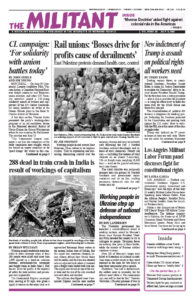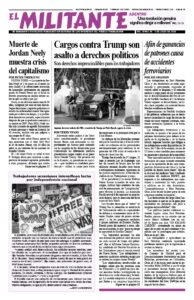In an effort to block a June 4 commemoration of those killed in Beijing’s Tiananmen Square in 1989, Hong Kong’s Victoria Park was filled with over 200 booths that weekend, part of a “Hometown Market Carnival.” That event was organized by supporters of the ruling regime in China to celebrate — almost a month early — the anniversary of Britain’s return of Hong Kong to Chinese rule.
But for decades tens of thousands of people in Hong Kong had packed the park to mark Beijing’s brutal crushing of the mass protest for political rights. The large encampment in Tiananmen Square, supported by millions of working people across the country, was violently destroyed by the army 34 years ago. No official death toll has been acknowledged, but estimates range from several hundred to thousands, with many more injured.
This year, notices near Victoria Park announced that no banners, leaflets, posters or anything else with a political message were allowed. They were backed up by the deployment in the area of thousands of uniformed police and anti-riot armored vehicles from the Chinese mainland, known as “Saber-Toothed Tigers.”
The government has sharply stepped up restrictions on political space since massive demonstrations rocked Hong Kong in 2019, forcing authorities to suspend passage of a bill authorizing extradition to mainland China. Huge actions demanding greater political freedoms continued through the end of that year.
In 2020 a sweeping national security law criminalizing virtually all forms of dissent was adopted by Beijing and imposed on Hong Kong. The Chinese rulers feared continuing demonstrations there could inspire protests on the mainland.
Over the past three years more than 60 organizations have been forced to shut down, including trade unions, media outlets, opposition political parties and groups like the Hong Kong Alliance in Support of Patriotic Democratic Movements of China, which in the past had been the organizer of the June 4 actions.
In March, three of the Alliance leaders were jailed for 4½ months, the first sentences under the new law. Chow Hang-tung, one of the three, told the court their sentencing was about punishing people for defending the truth. National security, she said, is being used as a pretext to wage a war on civil society.
“I think the people in authority do a great job in reminding us not to forget June 4,” Daniel Chan wrote to the Militant June 5. “The more they threaten us not to do anything, the more people are provoked to remember it and do something.”
After Debby Chan, a grocery-store owner, posted a few photos on social media of electric candles — representing the candles held up at June 4 protests — three government agents visited her. “The more we’re not allowed to talk about it, the more they make these moves, the more I feel it is the right thing to do,” she told the press. At the Chinese University of Hong Kong, students created tiny replicas of the “Goddess of Democracy” statue and hid them around the campus leading up to the Tiananmen anniversary. The original, built by protesters in Tiananmen Square, was toppled and destroyed by the Chinese military as they crushed the encampment.
Wearing a black T-shirt or holding a small flower, symbols associated with the 2019 protests, was met with a police response. “I can’t help think that the people in authority are more scared than we the people,” Daniel Chan wrote. He said more than 30 people had been arrested outside Victoria Park. Four of them were charged with “seditious intent.”
In mainland China, even the existence of the Tiananmen Square revolt is a tightly censored subject. Many Chinese internet users reported June 4 their social media accounts had been temporarily or permanently suspended for marking it.

